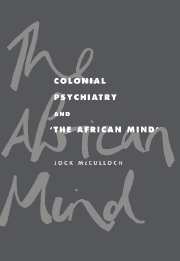Book contents
- Frontmatter
- Contents
- Acknowledgements
- 1 Introduction
- 2 Psychiatry and colonial practice
- 3 Some contemporary reviews of colonial mental health systems
- 4 Towards a theory of the African mind
- 5 Theory into practice: Carothers and the politics of Mau Mau
- 6 African intelligence, sexuality and psyche
- 7 The African family and the colonial personality
- 8 The elements of orthodoxy
- 9 From psychiatry to politics
- 10 Conclusion
- Notes
- Bibliography
- Index
3 - Some contemporary reviews of colonial mental health systems
Published online by Cambridge University Press: 04 December 2009
- Frontmatter
- Contents
- Acknowledgements
- 1 Introduction
- 2 Psychiatry and colonial practice
- 3 Some contemporary reviews of colonial mental health systems
- 4 Towards a theory of the African mind
- 5 Theory into practice: Carothers and the politics of Mau Mau
- 6 African intelligence, sexuality and psyche
- 7 The African family and the colonial personality
- 8 The elements of orthodoxy
- 9 From psychiatry to politics
- 10 Conclusion
- Notes
- Bibliography
- Index
Summary
Judgements made of past medical practice may enjoy the advantage of historical reflection, but they tend to be misleading. Fortunately, during the colonial period a number of reviews of asylums were commissioned by governments, and these provide us with insight into contemporary judgements of the hospitals. They enable us to identify their recognized failings and also to assess the extent to which the asylums functioned according to the intentions of their creators.
In June 1936 Dr R. Cunynham Brown arrived in Lagos to begin a survey of the care and treatment of lunatics in the West African colonies of Nigeria. His commission from the Colonial Office included a review of the role of African doctors in treating the mad. Cunynham Brown's survey was a pioneering work, and his references to African healers suggest a willingness to take their methods seriously. He visited most of the asylums in the colonies but, as he acknowledged in the preface to his report, Nigeria is a large and diverse country of which he was only able to see a small part. There were major differences between tribal groupings in their treatment of the mad, and he could find no reliable data on the number of the mentally ill. He was certain, however, that the large number of urbanized Africans in asylums was the result not of any ‘clash of cultures’ but of proximity to the asylums.
- Type
- Chapter
- Information
- Colonial Psychiatry and the African Mind , pp. 29 - 45Publisher: Cambridge University PressPrint publication year: 1995



